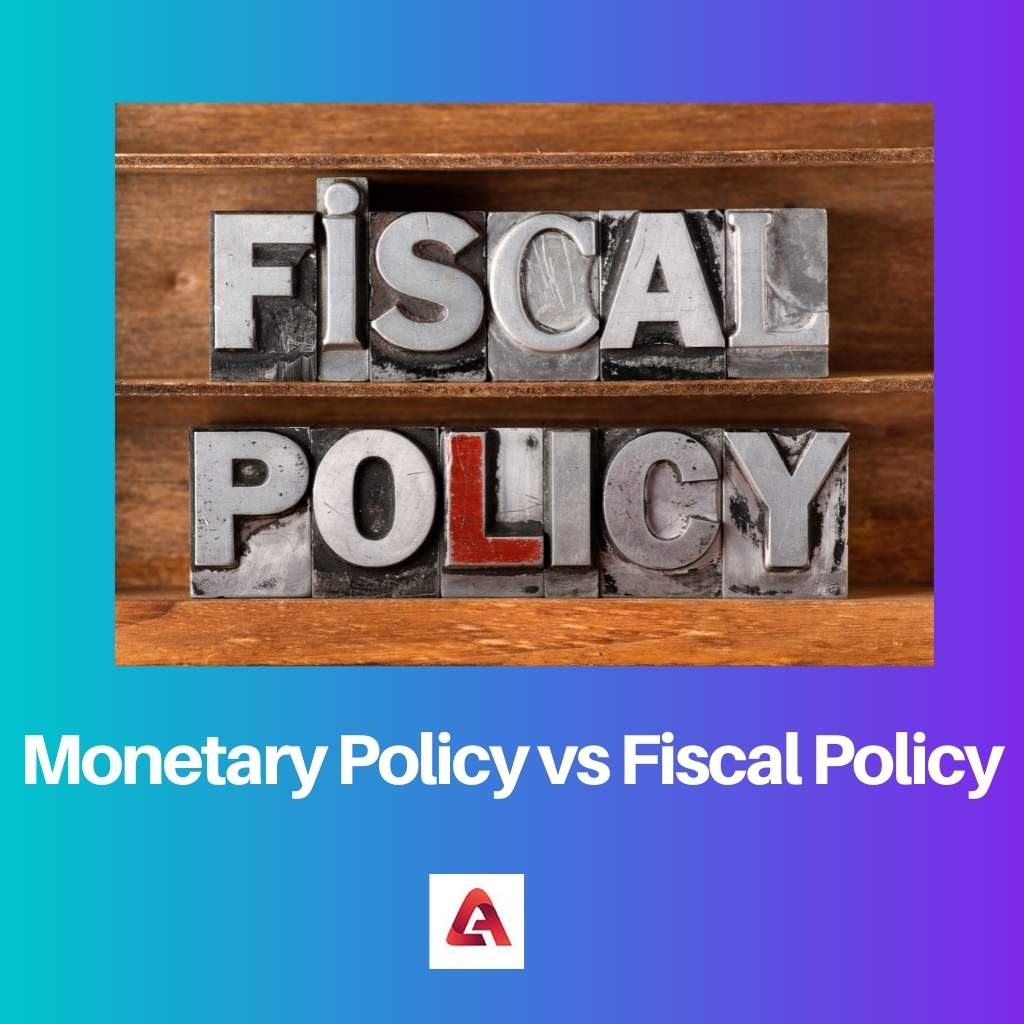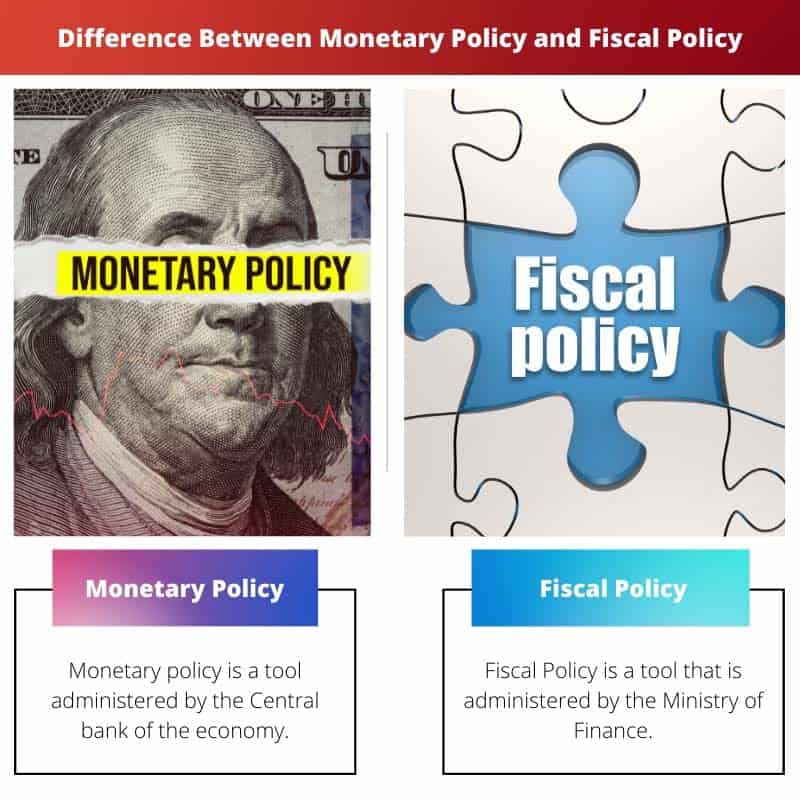The economy of any country is the most important topic to be discussed. Any economic decision of the country will affect its stability as well as its development and growth. There are many policies made by the government to regulate the economy of the country; Such two policies are Fiscal policy and Monetary policy.
Both are used to drive the country’s growth and economic development but have significant differences.
Key Takeaways
- Monetary policy involves managing the money supply and interest rates to influence the economy, whereas fiscal policy involves government spending and taxation to influence the economy.
- A central bank implements monetary policy, while the government determines fiscal policy.
- Monetary policy affects the economy by influencing the availability of credit and the cost of borrowing, whereas fiscal policy affects the economy by changing government spending and taxation.
Monetary Policy vs Fiscal Policy
Monetary policy is the actions taken by a central bank, such as the Federal Reserve in the United States, to control the supply of money and credit in the economy. Fiscal policy is the use of government spending and taxation to influence economic activity. The goal of fiscal policy is also to promote economic growth and stability.

Monetary policy is managed by Central banks, which ensures the economy is stable throughout and works on the country by reducing inflation, managing employment levels, and regulating the flow of money.
It doesn’t affect the economy directly, and unlike fiscal policy, it doesn’t change every year. It has low political influence and is mostly independent.
Fiscal policy is managed by the Ministry of Finance, which is used for the growth and development of the economy of the country and works on the government’s collection and government’s spending.
The tools used for this purpose are tax rates, public spending, and demonetization. It has a very strong political influence. It has a direct effect on a country’s economy.
Comparison Table
| Parameters of Comparison | Monetary Policy | Fiscal Policy |
|---|---|---|
| Definition | Monetary policy is a tool administered by the Central bank of the economy which is used to regulate the flow of money and rates of interest. | Fiscal Policy is a tool that is administered by the Ministry of Finance and is used in the management of tax revenues and spending for the benefit of the economy. |
| Purpose | To achieve stability of price, stable economic growth, managing employment, controlling inflation. | To achieve growth and development of the economy of the country. |
| Tools used | The tools used are reserve requirement, discounted rates, credit ratios, interest on reserve, and open market operations. | The tools are mainly public spending, demonetization, and taxes. |
| Nature | It doesn’t change every year, but changes when the economy is needed to change. | After reviewing the previous year’s result, it changes every year. |
| Impact | Generally used to encourage or discourage them from investing in economic activities and has no direct impact on the economy. | It directly impacts the economy of the country and impacts the budget deficit. |
What is Monetary Policy?
Monetary Policy is one of the tools used by Centraal banks that helps them in regulating the flow of money, which involves a change in the interest rates and influences the money supply.
Monetary policy focuses on the stability of the economy. It helps to control inflation management of employment levels and has less impact on the real economy, and has effects on borrowing and mortgages.
Monetary Policies last longer and have less political influence. Unlike Fiscal policies, they don’t change every year and change only when the economy needs to be changed.
It has various tools that help it in achieving its goals, such as reserve requirements, discounted rates, credit ratios, interest on reserve and open market operations, etc. Monetary policies are independent, and they are decided by the banks only. They are less preferred as, in some cases, they can cause inflation.

What is Fiscal Policy?
Fiscal policies are one of the policies which are managed by the Ministry of Finance, and the focus is to bring growth and development in the economy of the country.
It focuses on the tax rates and spending of the government. They are responsible for changing the taxation levels and government spending levels. Unlike Monetary policy, they are dependent and have much more political influence.
There are no such specific targets, and they are changed every year. They are preferred to Monetary policies. It directly impacts the economy and the budget deficit. For this, they used the tools such as public spending, demonetization, and taxes.
Government can increase their amount of spending in case they see not much economic activity going on. It works on government collection and spending for the growth of the economy.

Main Differences Between Monetary Policy and Fiscal Policy
- Monetary policy is managed by the Central banks, whereas Fiscal policy is managed by the Ministry of Finance.
- The monetary policy regulates the flow of money by using tools like reserve requirements, discounted rates, credit ratios, etc., whereas Fiscal policies manage tax revenues and spending using the tools such as public spending, demonetization, and taxes rates etc.
- Monetary policies don’t change every year and change only when the economy needs to be changed, whereas Fiscal policy changes every year.
- Monetary is not preferred and has no political influences, whereas Fiscal is preferred and has good political influences.
- Monetary policies focus on the stability of the economy, whereas Fiscal policies focus on the growth and development of the economy.

- https://papers.ssrn.com/sol3/papers.cfm?abstract_id=227060
- https://www.econstor.eu/handle/10419/217647

The detailed explanation of both monetary and fiscal policy was extremely helpful. The article did a fantastic job of clarifying the nuances between them.
I couldn’t agree more, Rob90. It’s rare to find such a comprehensive breakdown of these policies, and this article delivered exactly that.
Absolutely, the article’s detailed analysis was incredibly illuminating. The distinctions between monetary and fiscal policies are much clearer to me now.
Thank you for providing such a detailed explanation of monetary and fiscal policy. The clear comparison table was especially helpful.
I agree, the explanation was very clear and made it easy to understand the differences between the two policies.
The article thoroughly explained the impact and nature of both monetary and fiscal policy. This kind of detailed analysis is valuable to readers.
I completely agree, Jim. The article has provided a comprehensive understanding of how these policies function and influence the economy.
The distinction between monetary and fiscal policy is crucial for understanding how the government influences the economy. This article provided an excellent overview.
I couldn’t agree more. It’s essential for citizens to understand these policies and how they impact the country’s economic growth.
Absolutely, Mandy. Fiscal and monetary policies play a significant role in shaping the financial landscape of a nation, and this article made that distinction very clear.
The detailed explanation of monetary and fiscal policy was incredibly insightful. This article has equipped me with a richer understanding of these important economic mechanisms.
I share your sentiments, Stevens Jim. The article provided a comprehensive analysis of these policies, which has proven to be an invaluable resource for anyone interested in economics.
The comparison table was very informative. It effectively highlighted the distinctions between monetary and fiscal policy.
Agreed, Xclarke. The comparison table was a great visual aid for comprehending the key differences between these two policies.
I found the table to be incredibly helpful as well. It made it easy to understand the differing natures of these policies.
Great article! I now have a better grasp of the differences and purposes of monetary and fiscal policy.
This article provided a comprehensive understanding of the tools and natures of monetary and fiscal policy. It was a valuable educational resource.
I couldn’t agree more, Roberts Carmen. The article was thorough in its explanations, and I found it to be an enriching educational experience.
Absolutely, Carmen. The article’s in-depth analysis was immensely informative, and it provided valuable insights into these important economic policies.
The details provided in the article have significantly deepened my understanding of the impact and nature of both monetary and fiscal policy.
I agree, Lindsay22. The thorough exploration of these policies was incredibly enlightening, and it’s been a valuable learning experience.
The comparison between monetary and fiscal policy was presented in a clear and concise manner. It was easy to understand the differences between the two.
Well said, Paula. The article effectively demystified the convoluted nature of these policies, making it an enlightening read for anyone interested in economics.
I completely agree, Paula. The clarity of the article’s explanations made it very accessible for readers to comprehend the complexities of these policies.